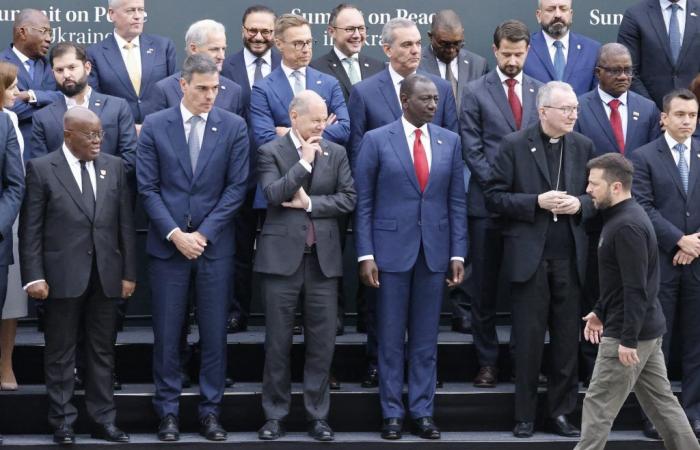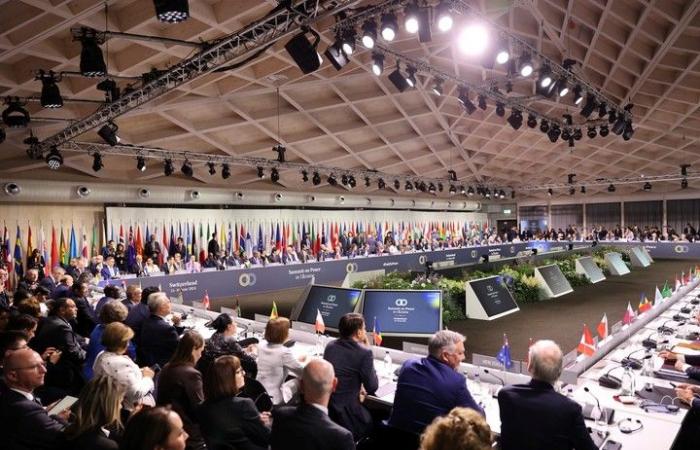The Peace Summit for Ukraine held in Switzerland, which presented the absence of Russia as a major handicap, ended this Sunday with a diplomatic triumph for the Ukrainian president, Volodymyr Zelensky, who managed to ensure that support for his cause was not only European, but global, despite some discrepancies.
Neither Russia nor China were present at the meeting, which closed with a declaration supported by nearly 80 of the 92 participating countries.
“We believe that achieving peace requires the involvement and the dialogue between all parties,” said the document consulted by AFP.
The statement also reaffirmed “the principles of sovereignty, independence and territorial integrity of all States, including Ukraine”called for a prisoner exchange and asked for the return home of the children deported to Russia.
Brazil, India, Saudi Arabia and the United Arab Emirates They did not appear on the list of countries that supported the final declaration, announced on the screen.
Along with the leaders of the EU and NATO, Zelensky’s usual allies in large meetings, on this occasion there were also presidents and heads of state from Latin American, African and Asian countries, something that the Ukrainian leader wanted to show that the war against Russia is not just a continental problem.
“We have had the participation of presidents and representatives at different levels from 101 countries and organizations, it is a success, and Russia did everything it could to prevent some from coming, but I thank them for showing their independence,” said the Ukrainian president in the press conference he gave at the end of the summit.
“We must do our job, let’s not think about Russia, let’s do what we have to do. For now, Russia and its leaders are not ready for a just peace. It is a fact,” declared the Ukrainian president.
Symbolic was that in the final appearance not only President Zelensky, his Swiss counterpart Viola Amherd as host, or the European Commission’s Ursula Von der Leyen appeared before the hundreds of journalists, but also figures such as the Chilean president Gabriel Boric or the Ghanaian Nana Akufo-Addo.
Latin American voice at the summit
“The peace summit marks the beginning of a significant process. For the first time numerous global leaders from all continents and different political ideas have come together to discuss peace instead of war, this summit represents a beacon of hope and will serve to fuel lasting peace talks,” said the Chilean president.
In the plenary sessions on Saturday and Sunday, which Zelensky acknowledged that he wanted them to be broadcast live and not behind closed doors so that “the world could see the global support,” The Argentine president Javier Milei and the Ecuadorian Daniel Noboa also participated.part of the more than 60 heads of state and government who took part in the summit.
Von der Leyen, who acknowledged that the summit “was not a peace negotiation because Putin is not seriously considering ending the war,” said that “the high level of participants in it shows that the world cares deeply about the war.” .
At the meeting of leaders, one of the largest in recent decades with an extraordinary nature (outside of periodic annual meetings such as those of the G20 or the United Nations Assembly), the aim was to discuss the effects of the Ukrainian war for the rest of the world, including in geographically distant regions.
It was for this reason that the leaders were divided this Sunday into different tables that discussed nuclear safety and food insecurity that situations such as the blockade of the Black Sea have brought to developing countries, or the humanitarian dimension of prisoners of war and children kidnapped by Russia from the parts of Ukraine it controls.
A moderate statement and not signed by everyone
The final declaration reached after the summit highlighted precisely the need to address these threats, although in a relatively moderate tonesince he did not even refer to Russia as an aggressor force.
Despite this, it was not possible for 12 countries that participated in the summit (with low-level delegations instead of their heads of state) to sign the document, including prominent regional leaders such as Brazil, Saudi Arabia, India, Indonesia or South Africa.
This – added to the absence of China, which in the past has presented its own peace proposals for Ukraine, or the last minute cancellation of the presence of Colombian President Gustavo Petro – indicates that support for Ukraine is not yet completely compact. at a global level.
“All opinions must be respected,” Zelensky simply noted in response to the decision of some countries not to sign the joint declaration.
The Russian position
Russian President Vladimir Putin stated on Friday that he will negotiate with Ukraine sIf it withdraws its troops from the four regions that Moscow claims and partially occupies, and if kyiv renounces joining NATO.
But both kyiv, NATO and the United States rthey rejected Moscow conditions to end the war.
Kremlin spokesman Dmitri Peskov insisted Sunday that this was not an “ultimatum” but a “peace initiative that takes into account the realities on the ground.”







